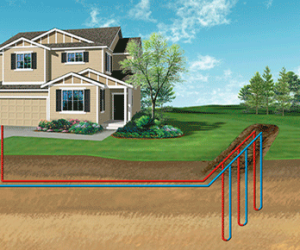Geothermal energy is produced from heat inside the earth. The temperature at the earth’s core is approximately 5,400 degrees Celsius (9,700 degrees Fahrenheit). From the surface, a few degrees of heat can generally be observed at depths of 20 – 30 m (65 – 100 ft), although this is highly variable.
Pros
- Environmentally friendly
- Renewable
- Constant Energy Source
- Comfort
Cons
- Cost to Install
- Resource quantity is highly variable
- Groundwater contamination
Environmentally Friendly
The only environmental destruction associated with geothermal systems is a small energy input required due to the pumps that push the heat exchange fluid through the ground loop. This is usually about 20% of the amount of output energy, in other words, the “efficiency” of the system is about 500%, compared to under 100% for natural gas systems which convert natural gas to heat via combustion.
Other sources of clean energy such as nuclear and wind power have corresponding drawbacks (like nuclear meltdown, or killing birds). Geothermal energy does not have any other issues. It is a true “clean” solution.
Renewable
As you can imagine, the water obtained from the earth will continue to be hot, year after year. However, once a geothermal energy system is installed there is a small permanent heat loss associated with the removal of energy from the system. As long as the replenishment of the heat energy in the system continues at the rate of the energy removal, the energy source will be permanent. This is usually not a concern.
Constant Energy Source
There are no down times to a geothermal system. Unlike solar power, which needs to be stored to ensure a constant supply, geothermal is a constant source of heat, day or night, hot or cold.
Comfort
Most people report that geothermal energy in a house or building results in quieter, more comfortable heating and cooling. Firstly, the fan runs quieter for longer periods of time, resulting in a more constant temperature throughout the building. Secondly, there is no need for a noisy air conditioner.
Cost to Install
The payback period for the installation geothermal systems is still not in a range that would make them competitive – usually about 10 years. Here’s a general rule I got from a supplier in my area. The supply and installation cost is roughly $1.50 – $1.80 per cubic foot of space to be heated. So if you have a 1,060 square foot house with 8 foot ceilings and two floors, you would have 1,060 ft2 x 8 ft x 2 = 16,960 ft3. The range of $1.50 – $1.80 results in $25,440 to $30,528. This is, of course, a very rough guide. More detailed numbers should be obtained from a dealer in your area, but spending that much one-time for a small bungalow of that size clearly will take many years to break even.
How much does it save? Most suppliers will tell you that a geothermal system will save about 50% of your heating bill and 75% on your cooling bill compared to natural gas (via preheating the hot water tank). A geothermal system will completely replace your natural gas furnace and air conditioner.
Resource Quantity is Highly Variable
In most areas this is not an issue. Maps have been produced by the governments of the United States, Canada and others which show that geothermal systems can be constructed almost anywhere. Indeed, it is safe to say that you can always drill deeper to find enough resources, although this does add to the cost. If your building is remote or you have no other geothermal installations in your area, be aware that an assessment might be needed.
Groundwater Contamination
This is also considered by many to be a major drawback, but most geothermal systems do not interact with the groundwater anymore. During the time when the technology was being developed (2000’s) there were some systems which were integrated with the groundwater. But today’s geothermal systems contain closed loops which are filled with heat exchange fluid (antifreeze). There is no interaction with the groundwater, and reports of pipes bursting are rare.

Speak Your Mind